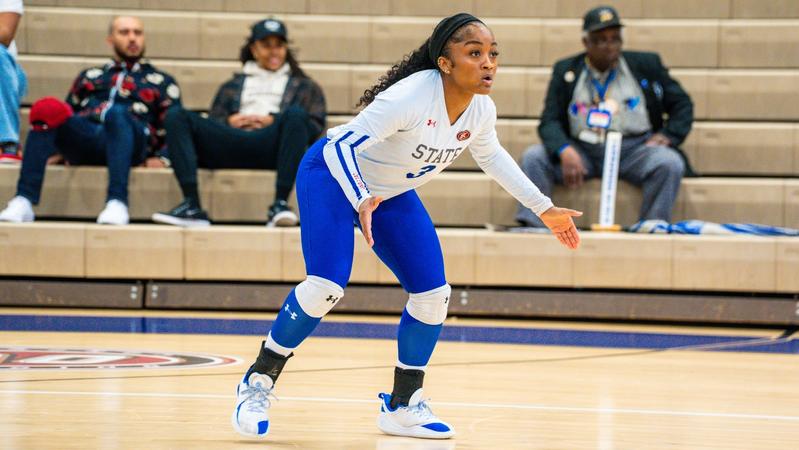NIL
Why Tennessee winning too much could be a problem for Danny White in era of paying players
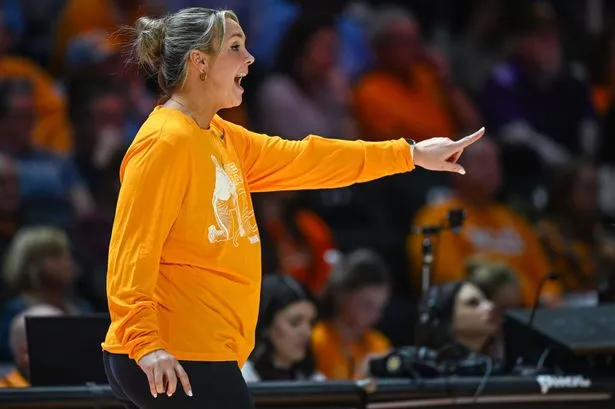

 AI-assisted summaryTennessee’s success across all sports creates a challenge in the new era of revenue sharing with athletes.The university must decide how to allocate funds among its successful football, men’s and women’s basketball, and baseball programs.NIL deals will continue to play a significant role in recruiting and retaining athletes, supplementing revenue-sharing payments.The University of Tennessee has cultivated a well-earned identity as the “everything school” in athletics because it’s won at a high level in every sport in recent years.
AI-assisted summaryTennessee’s success across all sports creates a challenge in the new era of revenue sharing with athletes.The university must decide how to allocate funds among its successful football, men’s and women’s basketball, and baseball programs.NIL deals will continue to play a significant role in recruiting and retaining athletes, supplementing revenue-sharing payments.The University of Tennessee has cultivated a well-earned identity as the “everything school” in athletics because it’s won at a high level in every sport in recent years.
Most visibly, the Vols made the College Football Playoff, won a baseball national title and reached the Elite Eight in men’s basketball in the past year. And Lady Vols softball is a national title contender.
All 20 Tennessee programs reached the NCAA postseason or a bowl game in 2023-24, and many are still ranked in the top 10. UT has won the SEC All-Sports Trophy three straight times.
But as challenging as it was to earn that “everything school” reputation, it’s about to become more difficult to uphold it in the revenue sharing era.
It’s not a competitive issue on the field or court. It’s a potential player payroll problem.
Beginning July 1, schools will pay athletes directly by sharing revenue, pending approval of the House settlement in a conglomerate of federal antitrust lawsuits against the NCAA and power conferences.
Schools will pay athletes under a cap estimated at $20.5 million with percentages of revenue assigned to revenue-generating sports like football, basketball and baseball. That’s in addition to income players earn from name, image and likeness deals from third parties.
But in direct school-to-player pay, there will be different strategies. One school will overpay men’s basketball players on a Final Four contender and offset the cost by underpaying players in a losing baseball program. Another will take a few bucks off the football players’ payroll and redirect it to women’s basketball players.If a program struggles, its players could be underpaid. If a program wins consistently, its players could be overpaid.UT’s blessing and curse is that it’s good in virtually every sport. That means tough decisions lie ahead, and the demand grows for extra money in NIL.How Tennessee could pay players aside from NILUT has not disclosed its approach to revenue sharing. But it appears UT, like most SEC schools, will distribute the money to athletes according to revenue their sports produce.A model was prescribed in the preliminary House settlement based on the national averages of per-sport revenue:75% to football players15% to men’s basketball5% to women’s basketball5% to other sports (including baseball)Those percentages likely will be calculated in an $18 million budget, instead of $20.5 million, because $2.5 million will count toward new scholarships with increased roster limits.The SEC could mandate member schools to follow this plan exactly, and that uniformity would benefit schools like UT that win in everything.If the SEC doesn’t mandate a plan, a few schools could tweak their percentages to gain an edge in recruiting and roster building in a specific sport to the detriment of another sport. Schools in other conferences will make the same adjustments for a competitive advantage in select sports.That’s where UT runs into a dilemma. Among its major revenue-generating sports, it doesn’t have a weak program.Tennessee wins too much to short-change any sport
Imagine UT athletics director Danny White trying to trim the player payroll of a specific sport.
He can’t do that in football. That’s where about three-fourths of UT’s sports-specific revenue is generated. And in the SEC, football determines success or failure.
Could White short-change men’s basketball? Not when Rick Barnes is knocking on the door of the Final Four.
What about Lady Vols basketball? White hired Kim Caldwell a year ago to rebuild the historically premier brand in the sport, and he’s not backing off now.
Baseball can’t go cheap. Tony Vitello guided the Vols to a national title, and the high-priced suites and seats in a renovated Lindsey Nelson Stadium won’t be filled if the program slumps.
Until NIL is under control, it still impacts winning
The solution to this payroll strain is traditional NIL, which is third-party money paid to athletes by businesses and booster collectives separate from the university.
Schools are allowed to pay a maximum of $20.5 million per year to athletes. But, in theory, there is no cap to third-party NIL pay.
In the revenue sharing system, a new NIL clearinghouse will vet deals to determine if they’re legitimate fair market agreements. But there’s skepticism of its effectiveness.
The richest schools will continue to top off revenue sharing money to players with NIL pay. Revenue sharing plus NIL will equal the total payroll for the highest paying schools.
That means NIL could still determine which programs gain an edge, even in the revenue sharing era.
Let’s say UT baseball has $1 million to spend on its roster because the Lady Vols must pay competitive revenues. But a rival school allocates $1.2 million to baseball because it has a weak women’s basketball program. The margin in baseball must be made up in NIL money.
Swap those UT programs, and the challenge is the same. The Vols want to remain at the top, but it gets crowded up there when player pay is a major factor.
UT payroll strategy must make every dollar count
UT was an industry leader when NIL began in 2021. It partnered with Spyre Sports, the collective that pays UT athletes for their NIL rights.
During that same period, revenues skyrocketed for UT athletics under White’s direction. But a share of that revenue going to athletes is only part of the equation, and NIL must be a difference-maker.
The good news is that UT’s leadership remains as it heads into the revenue sharing era. The bad news is that UT has more mouths to feed than most schools in terms of elite programs.
UT has enjoyed the most successful stretch in its history across all sports, in part, because White made sure those programs were well-resourced and followed focused plans.
But player payroll should have a more direct impact on winning than renovated stadiums, state-of-the-art training facilities and robust recruiting budgets. And because UT wants to maintain a championship level in so many sports, every dollar must be maximized.
That’s why it will require more money going to players and a savvy spending strategy to keep UT’s hot streak going.
Adam Sparks is the Tennessee football beat reporter. Emailadam.sparks@knoxnews.com. X, formerly known as Twitter@AdamSparks. Support strong local journalism by subscribing at knoxnews.com/subscribe.
Get the latest news and insight on SEC football by subscribing to the SEC Unfiltered newsletter, delivered straight to your inbox.
NIL
Danny White pokes Tennessee football fans on transfer portal NIL criticism
Updated Jan. 6, 2026, 8:27 p.m. ET
- Tennessee athletic director Danny White sarcastically responded on social media to fans who criticized the football team’s lack of transfer portal moves.
- Fans connected the team’s perceived lack of NIL funds to White’s focus on the planned Neyland Entertainment District.
- White’s social media clapback drew mixed reactions, with some fans calling it inappropriate and others defending his wit.
Tennessee athletic director Danny White appeared to take exception to fans blaming him for the football team’s relative inactivity in the transfer portal, and he responded with sarcasm.
Some UT fans didn’t believe this was funny or appropriate for an athletic director. Other fans applauded White’s wit in the face of criticism. It all transpired Jan. 6 on social media.
“I’ve been thinking that the Neyland Entertainment District could win us a national championship. Man, I’ve been thinking about this all wrong. Thank you for your insight!” White posted on X, responding to a UT fan about a touchy topic that requires context.
So let’s explain.
Why Danny White’s Neyland Entertainment District was targeted
It all started when White was tagged in a post on X that criticized Tennessee football’s work in the transfer portal. The Vols have added only two players since the portal opened Jan. 2, second-fewest in the SEC.
Some frustrated fans believe that UT doesn’t have enough NIL money to outspend competitors for the top transfers. They blame White, who raised football ticket prices in the 2025 season with a 10% talent fee to help UT’s portion of NIL pay for players.
White actually can’t increase UT’s NIL budget, which is capped by the College Sports Commission, an independent regulatory body established by the power conferences. Nevertheless, fans targeted his latest facility project in their criticism.
“For all the good he has done @AD_DannyWhite needs to throw some money at the portal and give up on turning Neyland into a night club,” @johnboy7501, who identifies as a UT fan, posted on X.
Another UT fan, @Irish_Hammer_71, then replied on X: “100% – we need to go after top tier talent in the portal. Not names to fill a roster spot. Entertainment districts don’t win national championships. That is still the goal, right?”
Those UT fans were referring to the Neyland Entertainment District, an ambitious project in the planning stages to be built adjacent to Neyland Stadium. The mixed-use sports entertainment district would include a hybrid condo-hotel overlooking the stadium, a rooftop bar, restaurants, shops, event space and fan experiences.
The project was initially estimated to cost $167 million, not including the G10 garage reconstruction and a stadium gate ramp reconfiguration to align with the district. The preliminary schedule projected completion in late 2028, but a lot of factors could determine that.
White has proudly promoted the development of the Neyland Entertainment District since it was first announced in 2023. So the UT fans appeared to have struck a nerve.
How Tennessee fans responded to White’s social media post
The fact that White responded to Tennessee fans in that way raised eyebrows. Most athletic directors don’t respond directly to fans’ criticism, especially on social media.
That’s why UT fans fired back on X. Here’s just a sampling.
@BoRansom: “Being a sarcastic prick will really endear you to us. Big brain decision there.”
@jgrider98: “This is embarrassing.”
@DoubleJBranum: “You should’ve just texted a buddy! Can’t clap at a fan on Twitter. Be better!”
@SomeRndmGuyUT: “This is a bad look Danny. The original post wasn’t even directed at you. Seriously man, don’t go looking for fights.”
@VOLndator: “You think that you have it all figured out and you don’t Danny. Read the room.”
Others UT fans defended White for responding to what they thought was a misguided gripe, blaming a future facility project for a perceived lack of NIL money to pay transfers.
@BarstoolTenn: “Don’t fall for the rage baiters danny”
@garrickledford: “Thank you, Danny. Please continue to dunk on the curmudgeons. GBO.”
@Wesley_Hayes99: “Entertainment district will be a revenue source for the university, and in turn will help us compete for championships. Chess, not checkers kids.”
Why Danny White can’t increase Tennessee’s NIL budget
Putting the social media kerfuffle aside, White had a valid point, albeit expressed in an ill-advised way.
Funding for a university facility project is unrelated to NIL money paid to players. Specifically, the Neyland Entertainment District is being developed through a public-private partnership. And it will generate revenue for the university from condo sales, hotel room and event space rentals, food and beverage sales, retail, sponsorships and more.
Meanwhile, NIL money is a fixed line item on the athletic department budget.
Four hours after his original social media post, White explained.
“It is being built, and funded, by private developers. It’s a public-private-partnership, similar to the residence halls we are building,” White posted on X. “There are no funds associated with this project that could be used, in any way, for NIL. There could however, be NIL opportunities for our athletes once the project is complete and open for business.”
Since July 1, colleges have been allowed to pay student-athletes directly for use of their name, image and likeness. But that money is capped at $20.5 million per year for all schools. No matter how much money White wants to dedicate to bolstering the football roster, his hands are tied by those NIL restrictions for direct school-to-player pay.
Student-athletes can earn additional NIL money from third parties like NIL collectives, university partners, boosters and business owners. And that third-party money, which often comes from wealthy donors, creates the gap between the richest football programs and the second-tier programs.
Granted, UT works with NIL partners and collectives to generate third-party money for its athletes. But that third-party NIL money is outside the purview of the university and athletic director. And by rule, university employees aren’t allowed to guarantee third-party NIL money to recruits and transfer prospects.
Adam Sparks is the Tennessee football beat reporter. Emailadam.sparks@knoxnews.com. X, formerly known as Twitter@AdamSparks. Support strong local journalism by subscribing at knoxnews.com/subscribe.
Get the latest news and insight on SEC football by subscribing to the SEC Unfiltered newsletter, delivered straight to your inbox.
NIL
Major NIL deal reportedly not ‘deciding factor’ for No. 1 transfer portal player
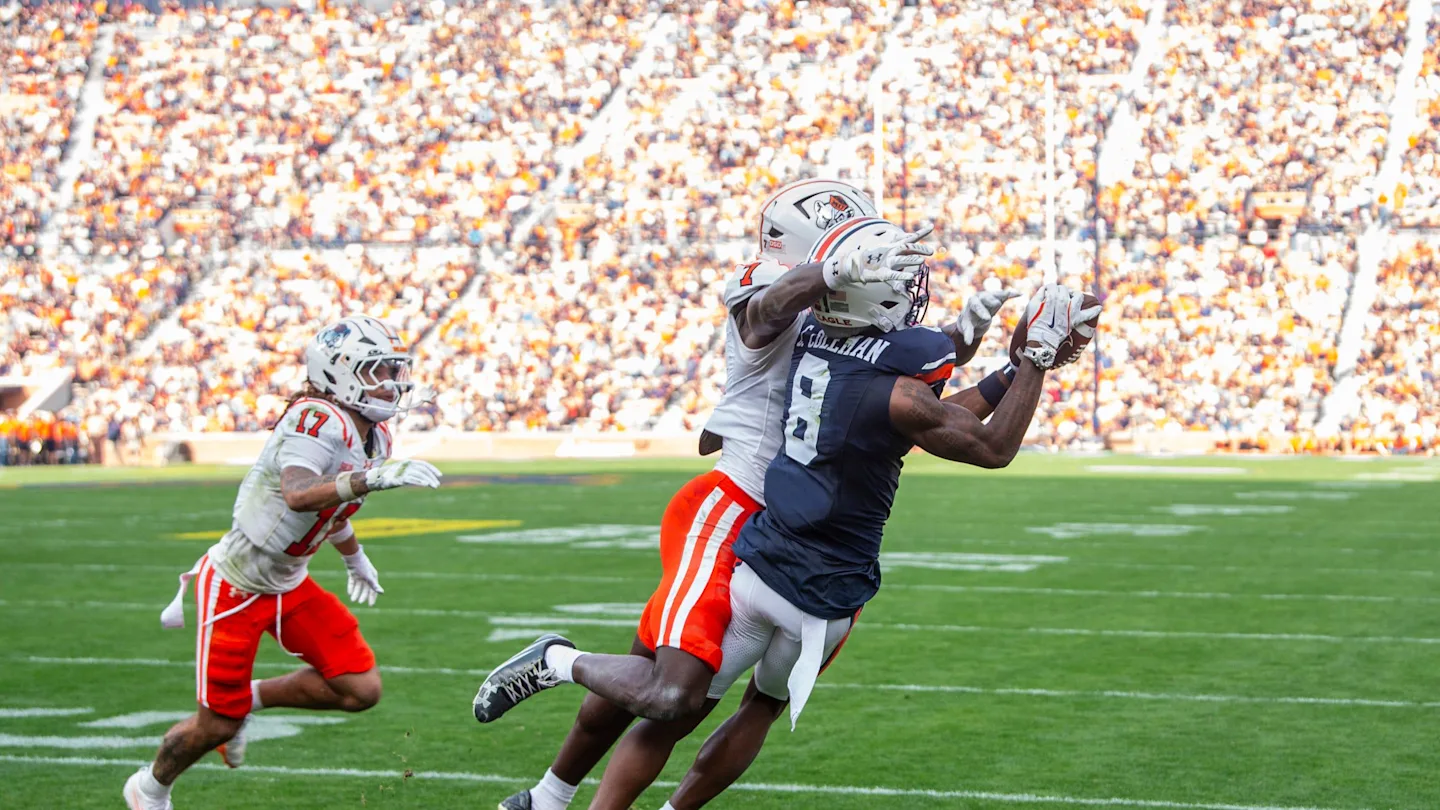
The 2026 NCAA transfer portal has opened for all college football players seeking different surroundings. The portal opened on Friday and will remain so until Jan. 16.
Over 3,000 college football players have chosen to transfer to new programs for the 2026 season. While the headlines have focused on quarterbacks in the 2026 transfer portal cycle, many important offensive skill players are also on the move across the college football landscape.
The most important of these offensive skill players in the transfer portal is former Auburn wide receiver Cam Coleman. He will have two seasons of eligibility remaining at his second school.
The 6-foot-3, 201-pounder was recruited by Hugh Freeze to Auburn in the Tigers’ 2024 recruiting class. Coleman appeared in 10 games during his freshman season, grabbing 37 receptions for 598 yards and eight touchdowns. He was voted to the SEC All-Freshman Team by his coaches that season.
Coleman saw an increase in production with the Tigers in the 2025 season. He made 56 catches for a team-high 708 yards and five touchdowns. Auburn finished the season 5-7, and Freeze was let go following the Tigers’ home loss to Kentucky.

Auburn hired former USF head coach Alex Golesh as its next head coach in late November. Coleman is one of a bevy of players from Auburn’s 2025 roster who have entered the transfer portal following Golesh’s hiring.
Coleman was a consensus five-star prospect in his initial recruitment to Auburn, ranking as the No. 2 receiver in the class of 2024. As a transfer, Coleman has the No. 1 overall ranking of receivers in the 2026 portal cycle.
While Coleman has been linked to several major programs in college football and will likely receive considerable compensation at his next stop, NIL packages are not among his top priorities in the portal. Pete Nakos of On3 reported that Coleman is visiting a handful of Power Four programs but is not likely to make a decision solely based on monetary value.
“There is confidence in multiple camps that they can offer the best opportunity for Coleman,” Nakos said. “Money is not going to be the deciding factor in this recruitment, even though sources have said his deal could be in the $2 million range.”
Texas A&M was the first of a trio of visits Coleman had set in the portal. He was committed to the Aggies for four months before flipping to Auburn on Early Signing Day in the 2024 recruitment cycle. Additional visits include stops at Texas Tech and USC, a pair of programs looking to stock up on wide receivers after losses in the offseason.
NIL
College football transfers with the highest NIL valuations
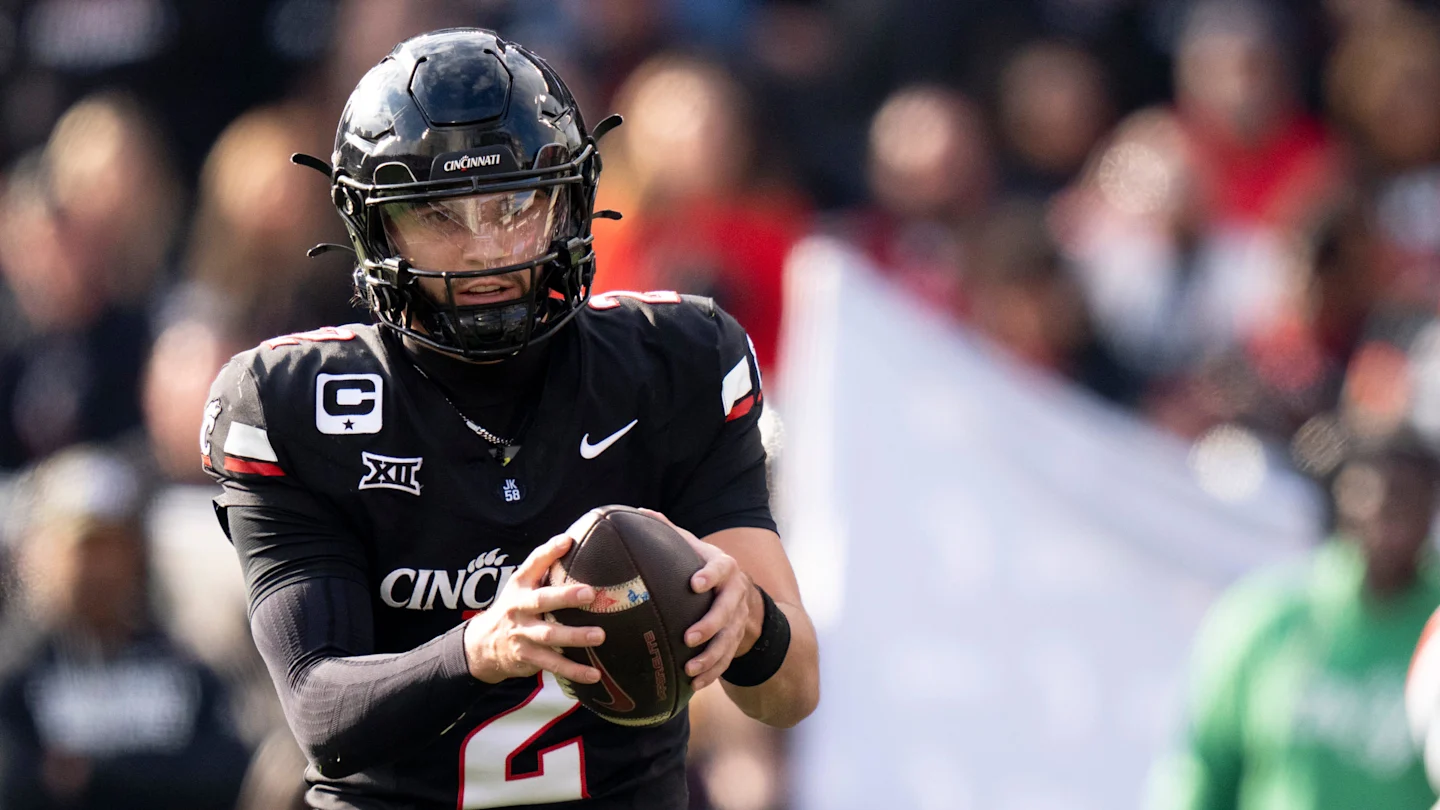
The NCAA transfer portal and the allowance of players to be paid for their name, image, and likeness (NIL) are undoubtedly the biggest driving forces behind the changes in college football.
The era of players waiting their turn at one school to play, or certain programs building dynasties off of being the best at paying players under the table, is no more. Now, programs that can get donors to scrounge together the most cash are in prime position to contend, which has led to new-age powerhouses like Indiana, Texas Tech and Ole Miss emerging.
With the NCAA transfer portal opening on Jan. 2, there have already been over 4,000 entries, but not every player will be getting the big bucks. The caliber at the top of the portal is as high as we have ever seen it, and some of college football’s most valuable players have found, or are in the process of looking for a new landing spot.
That said, let’s take a look at the players in the NCAA transfer portal with some of the highest NIL valuations, according to On3.
Byrum Brown (Auburn via USF)

To the surprise of no one, Byrum Brown followed his head coach, Alex Golesh, to Auburn. The 6-foot-3 dual-threat quarterback threw for 3,158 yards with 28 touchdowns, while also rushing for 1,008 yards and 14 more scores en route to leading the Bulls to a 9-3 regular season record.
NIL Valuation: $1.6 million
Beau Pribula (Missouri), Cam Coleman (Auburn), Cutter Boley (ASU via Kentucky)

The Missouri Tigers lost their star quarterback, who led them to a 6-1 start to the season, in what was really his first chance to start. Unfortunately an injury derailed his season and their momentum, but Pribula is still viewed as a high-end starter in college football.
As for Cam Coleman, the now-former Auburn wide receiver is due for a massive payday. Some reports have revealed he could earn as much as $2 million. He is ranked as the No. 1 overall player in the transfer portal, and very well could move up this list.
A Kentucky native, Boley impressed as the starting quarterback for the Kentucky Wildcats this season. He replaced Zach Calzada as the starter after two games, throwing for 2,160 yards with 15 touchdowns and 12 interceptions, while completing 65.8% of his passes. While there was obvious room for improvement, he steps into an Arizona State situation where he will be throwing to Colorado wide receiver transfer Omarion Miller and playing for one of the best offensive minds in the country, Kenny Dillingham.
NIL Valuation: $1.8
Dylan Raiola (Nebraska), DJ Lagway (Florida), Josh Hoover (Indiana via TCU)

Dylan Raiola was tabbed as the quarterback who would bring Nebraska back to prominence, but instead, his season was ended early due to an injury, and the writing was on the wall that he was leaving. Matt Rhule fired his uncle from the coaching staff, and his younger brother, who is a 2026 quarterback recruit, backed off his pledge. Raiola may not be an elite-tier quarterback, but he has a big arm and some creativity that could make him an intriguing add.
Similar to Raiola, who was also a five-star with plenty of hype, injuries plagued DJ Lagway at Florida. In his first full year as the starter, Lagway threw for 2,264 yards with 16 touchdowns and a brutal 14 picks. His spring camp saw him throwing at a limited capacity, and he also dealt with various other knicks along the way.
Josh Hoover will enter the 2026 season as college football’s leading returning passer, accumulating 9,629 yards at TCU. He will look to keep the hype train going at Indiana, as he is set to replace projected No. 1 overall pick, Fernando Mendoza.
NIL Valuation: $2 million
Drew Mestemaker (OK State via UNT)

If you love an underdog story, you’ll love Drew Mestemaker’s journey. He went from not starting a varsity game at quarterback in high school to leading college football in passing yards with 4,379. While he likely could have gone to any school he wanted, he decided to follow North Texas coach Eric Morris to Oklahoma State.
NIL Valuation: $2.3 million
Sam Leavitt (Arizona State)

The biggest domino that has yet to fall in the transfer portal is Leavitt, who is expected to command a massive payday in the portal. His numbers weren’t as eye-popping as 2024 when he led the Sun Devils to the College Football Playoff, but his dual-threat ability and elite ceiling has some of the biggest programs in the country knocking on his door.
NIL Valuation: $3.1 million
Brendan Sorsby (Texas Tech via Cincinnati)

Brendan Sorsby changed the trajectory of his career with the season he had in 2025. The former Indiana quarterback threw for 2,800 yards and 27 touchdowns, while throwing just five picks. He also added nine more touchdowns on the ground, and is an early contender for the top spot in next year’s draft. Going to Texas Tech not only put him on a title contender, but earned him what reports are calling a $5 million payday.
NIL Valuation $3.3 million
NIL
Sieg Named National High School Player of the Year by Maxwell Football Club
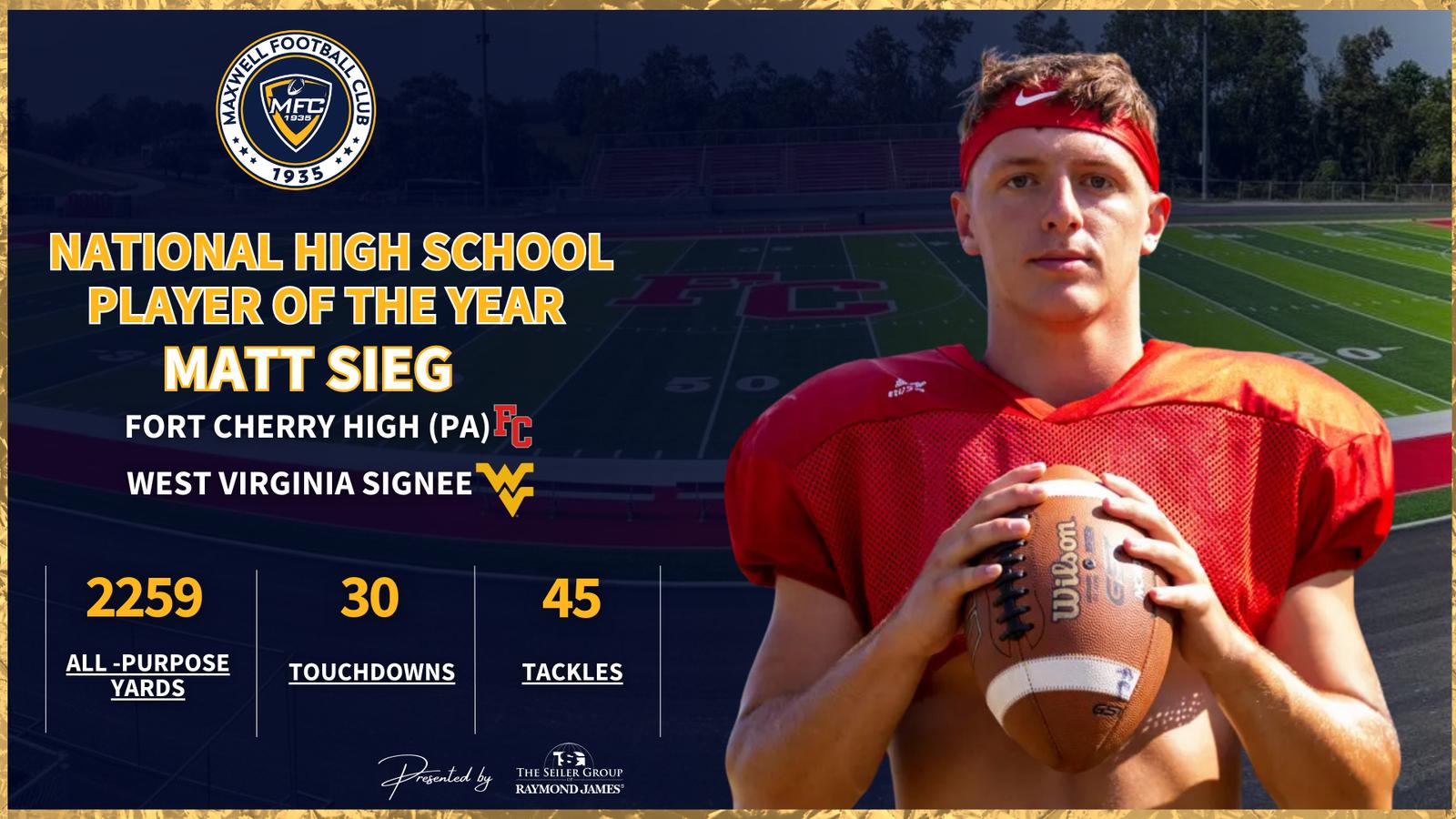
Sieg is the first WVU signee to earn the Maxwell Football Club’s High School Player of the Year Award and it marks the first time a Mountaineer football recruit won a national high school player of the year award since Robert
Alexander was named Parade Magazine Back of the Year in 1976.
Sieg also was named a High School All-American by the Maxwell Football Club. He was a three-time Pennsylvania Football Writers’ Class 1A All-State First Team honoree, the all-time leading rusher in Fort Cherry High School
history and the WPIAL 1A Player of the Year.
Sieg authored one of the most historic careers in WPIAL history, finishing with a 49–7 record, two WPIAL championships (2023, 2024) and league records in total offense (12,592 yards) and touchdowns (139). A generational dual-threat, he became just the second player in WPIAL history to surpass 4,000 rushing and 4,000 passing yards in a career, while also setting league marks as the first player to reach 5,000 rushing yards and 3,000 passing yards and to rush and pass for 1,000 yards in three consecutive seasons.
As a senior, he totaled 2,259 all-purpose yards and 30 touchdowns while adding 45 tackles and four interceptions on defense, leading Fort Cherry to a 12–1 record and a WPIAL 1A semifinal appearance. The four-time Black Hills Conference Offensive MVP ranks No. 2 in WPIAL career rushing (7,941 yards) and stands as Fort Cherry’s all-time leading rusher and passer, earning consensus four-star status and national rankings from ESPN, 247Sports\ and Rivals.
The formal presentation of the National High School Player of the Year Award will be held on Saturday, March 14, 2026, at the Coca-Cola Roxy Theatre in Atlanta, Georgia. The Maxwell Football Club will also be presenting its other national awards from college through the professional ranks at the event.
NIL
Longhorns Daily News: Texas has highest NIL transfer portal budget, data says
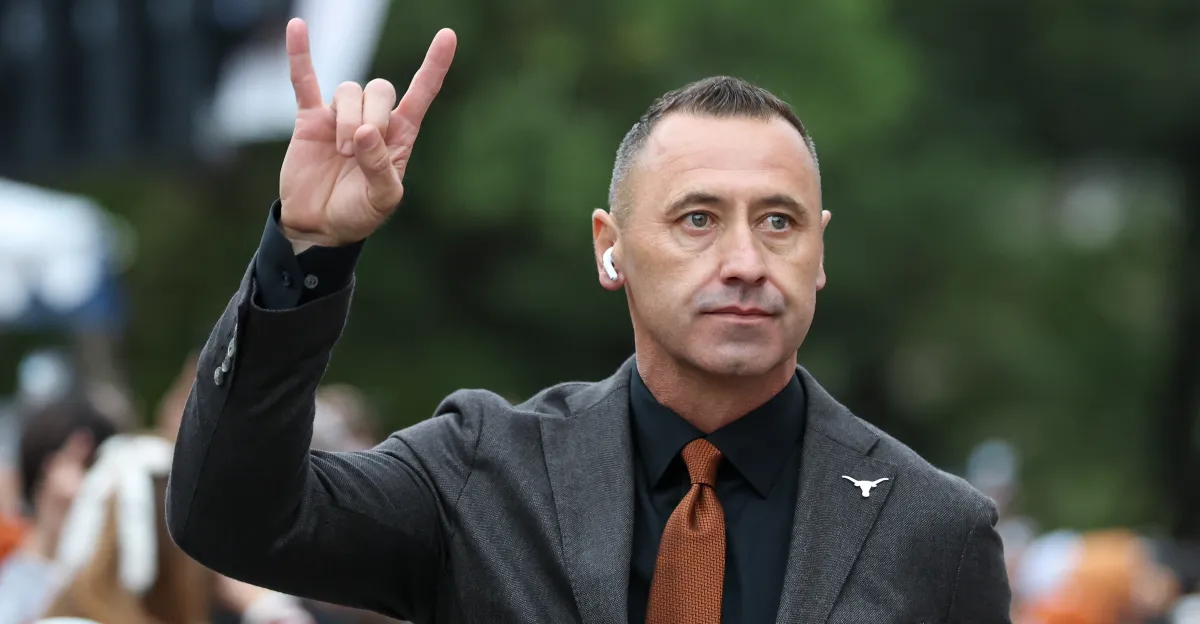
The website Sports Casting recently published data that pointed to Texas as the program with the nation’s biggest purse strings related to name, image, and likeness incentives for this year’s transfer portal, ahead of in-state juggernauts such as Texas A&M, Texas Tech, and others. Texas has $23 million in NIL funding, in fact, according to a graph Sports Casting published earlier today.
WHAT THEY’RE SAYING ABOUT THE LONGHORNS
247Sports: With Michael Masunas’ commitment, veteran Texas tight ends are under the spotlight in a crowded room
Inside Texas: Inside Texas Portal Intel: Cam Coleman, RB dominoes, and OL plans
ICYMI IN BURNT ORANGE NATION
247Sports: Texas Football Transfer Portal Tracker: All the Texas scoop, rumors, comings & goings as Longhorns fill roster
247Sports: Notes and nuggets from check-in day at the Navy All-American Bowl
247Sports: HoopHall West: New Year’s resolutions for every top-50 prospect
247Sports: Transfer Portal Intel: Latest updates on top players, led by team to watch for Sam Leavitt, as dominoes fall
247Sports: Arizona State’s Raleek Brown trending to Texas: How does he compare to outgoing RB Tre Wisner?
247Sports: Elite 2027 CB Duvay Williams’ visits come into focus at 2026 Navy All-American Bowl
Inside Texas: Texas Longhorns Portal Recruiting Intel: Latest from numerous Horns targets, coaches on road
Inside Texas: Texas’ early portal additions are creating a firm foundation
Inside Texas: How did Texas’ 2025 portal class fare this past season?
Inside Texas: Transfer Portal Reality Check: It’s okay to be frustrated, just don’t panic
Rocky Top Talk: LSU offensive tackle Ory Williams commits to Tennessee
A Sea Of Blue: Kentucky flips 4-star recruit Andre Clarke Jr. from Michigan
SB Nation: Baltimore Ravens’ 5 best head coaching options after John Harbaugh firing
SB Nation: The Panthers aren’t NFL’s worst playoff team ever, because this team is
SB Nation: TGL: Atlanta Drive GC stays undefeated in title defense with 7-4 win over The Bay
NEWS ACROSS LONGHORN NATION AND BEYOND
NIL
No. 1 college football team soars in transfer portal rankings after ‘swinging wildly’
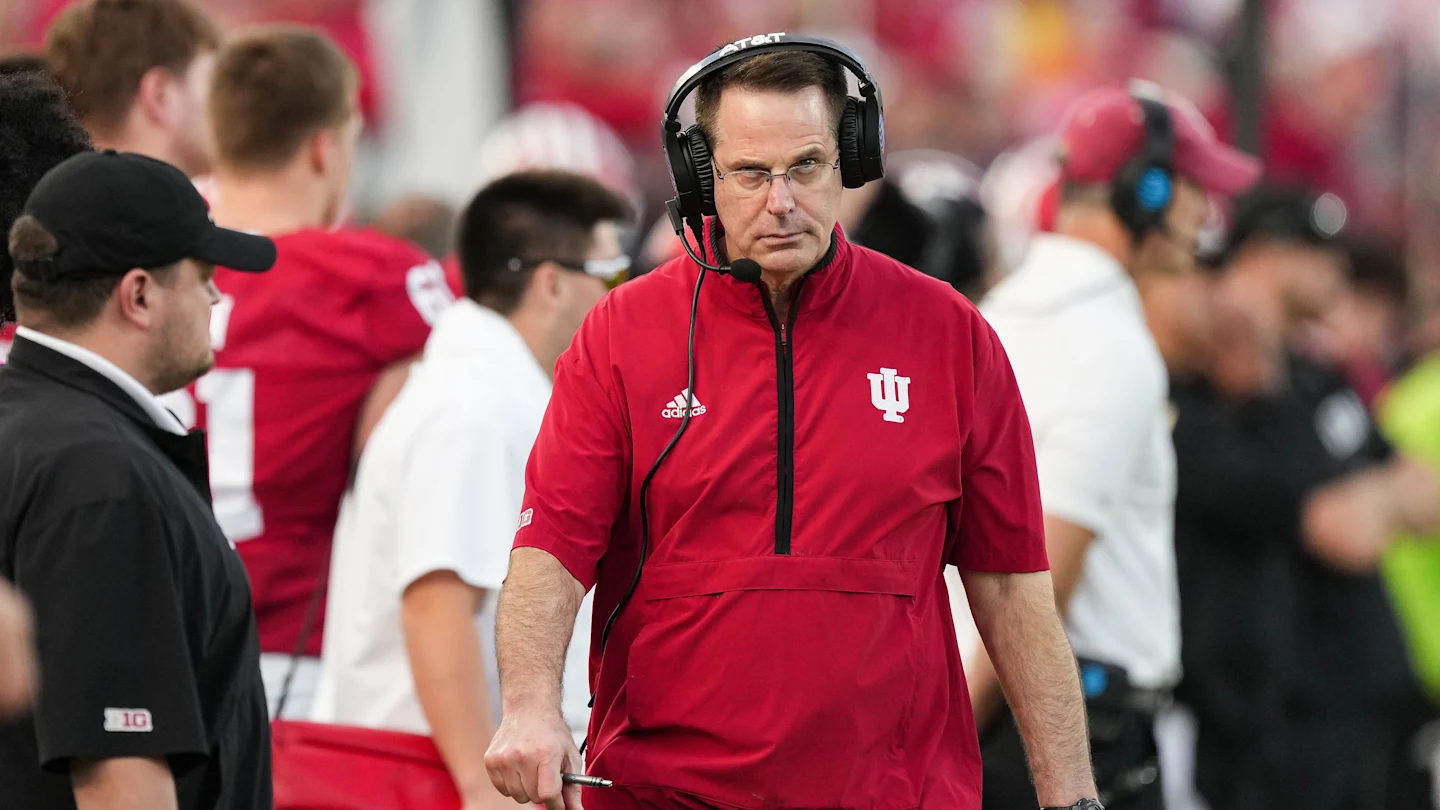
Indiana posted a major day in the early January transfer portal window, adding multiple experienced transfers on Sunday, including TCU quarterback Josh Hoover, Michigan State wide receiver Nick Marsh, and Boston College running back Turbo (Hanovii) Richard.
Hoover is a redshirt junior with a high-volume TCU resume, throwing for 9,629 career yards and 71 touchdowns with a 65.2% completion rate.
He set the Horned Frogs’ single-season passing record in 2024 with 3,949 yards (27 TDs, 11 INTs) and followed it up with another productive campaign in 2025, totaling 3,472 yards with 29 touchdowns and 13 interceptions.
Hoover is expected to enroll in January and is the projected heir apparent if Heisman winner Fernando Mendoza departs for the NFL.
Marsh is a 6-foot-3 receiver who led Michigan State in receptions and receiving yards in consecutive seasons, posting 41 catches for 649 yards and three touchdowns in 2024, followed by 59 receptions for 662 yards and six scores in 2025.
Richard entered the portal after a breakout 2025 season, rushing for 749 yards and nine touchdowns on 145 carries (5.2 yards per carry) across 11 games, while also contributing in the passing game with 30 catches for 213 yards and two receiving touchdowns.
Safeties Preston Zachman (Wisconsin) and Jiquan Sanks (Cincinnati), edge prospects like Tobi Osunsanmi (Kansas State) and Joshua Burnham (Notre Dame), and Chiddi Obiazor (Kansas State) have all reportedly transferred to Indiana as well.
On Sunday, Josh Pate described Indiana’s portal approach as “swinging wildly” and landing most of those swings, a shorthand for the Hoosiers’ aggressive, high-volume pursuit of established starters during the opening days of the transfer window.
“Indiana is swinging wildly, and it will probably shock approximately none of you to learn that they are landing every punch that they swing with,” Pate said.
“Josh Hoover, TCU quarterback, that’s who Curt Cignetti has circled, and so he is next in line to be a future Heisman finalist in Indiana… Nick Marsh, who I was really high on this past year, and then Michigan State was terrible, he’s headed to Indiana too… So Indiana is making some big moves here.”

Indiana completed a historic run in 2025, winning the Big Ten and advancing through the College Football Playoff, including a 38–3 win over No. 9 Alabama in the Rose Bowl (CFP quarterfinal) to enter the CFP semifinals as the No. 1 seed (14–0 at that point).
Head coach Curt Cignetti’s roster rebuild has relied heavily on the portal since his arrival, bringing in high-impact portal QBs such as Kurtis Rourke (Ohio) and then Fernando Mendoza (Cal), both of whom started and helped accelerate the program’s turnaround.
By landing established contributors, especially a high-volume quarterback and proven skill-position players, Indiana changes the odds for 2026 by signaling to recruits and opponents that the program is built to last rather than flash.
Read More at College Football HQ
- No. 1 transfer portal QB earns $5 million NIL deal after interest from major college football programs
- College football’s leading rusher linked to two college football programs in transfer portal
- College football programs loses 28 players to transfer portal
- College Football Playoff team loses 23 players to transfer portal
-
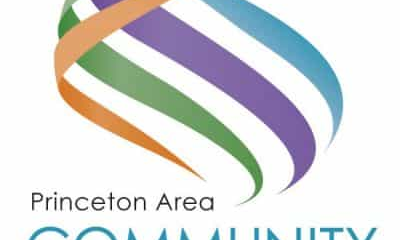
 Rec Sports3 weeks ago
Rec Sports3 weeks agoPrinceton Area Community Foundation awards more than $1.3 million to 40 local nonprofits ⋆ Princeton, NJ local news %
-

 Sports3 weeks ago
Sports3 weeks agoBeach Volleyball Unveils 2026 Spring Schedule – University of South Carolina Athletics
-

 Sports2 weeks ago
Sports2 weeks agoBadgers news: Wisconsin lands 2nd commitment from transfer portal
-
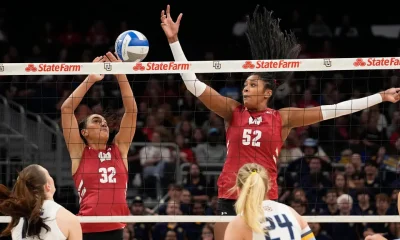
 Sports3 weeks ago
Sports3 weeks agoBadgers news: Final Four Game Thread vs. No. 1 Kentucky Wildcats
-

 Rec Sports5 days ago
Rec Sports5 days agoFive Youth Sports Trends We’re Watching in 2026
-

 Sports2 weeks ago
Sports2 weeks agoIs women’s volleyball the SEC’s next big sport? How Kentucky, Texas A&M broke through
-
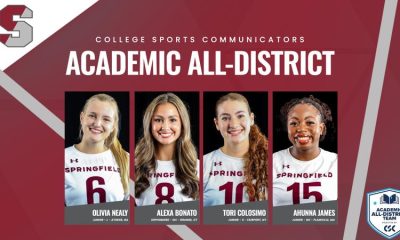
 Sports3 weeks ago
Sports3 weeks agoFour From Women’s Volleyball Named to College Sports Communicators Academic All-District Team
-
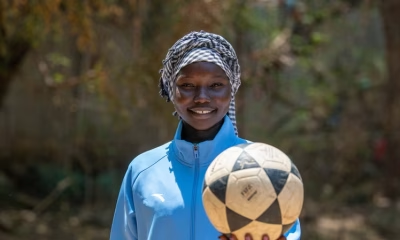
 Rec Sports3 weeks ago
Rec Sports3 weeks agoRefugee-Focused Youth Sport Initiatives : Moving for Change
-
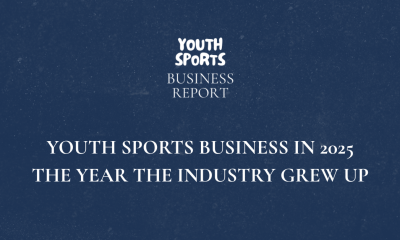
 Rec Sports3 weeks ago
Rec Sports3 weeks agoYouth Sports Business in 2025: The Year the Industry Grew Up
-
Rec Sports3 weeks ago
Inside the NWSL’s first combine: Can the league create a more robust pathway for American talent development?



































